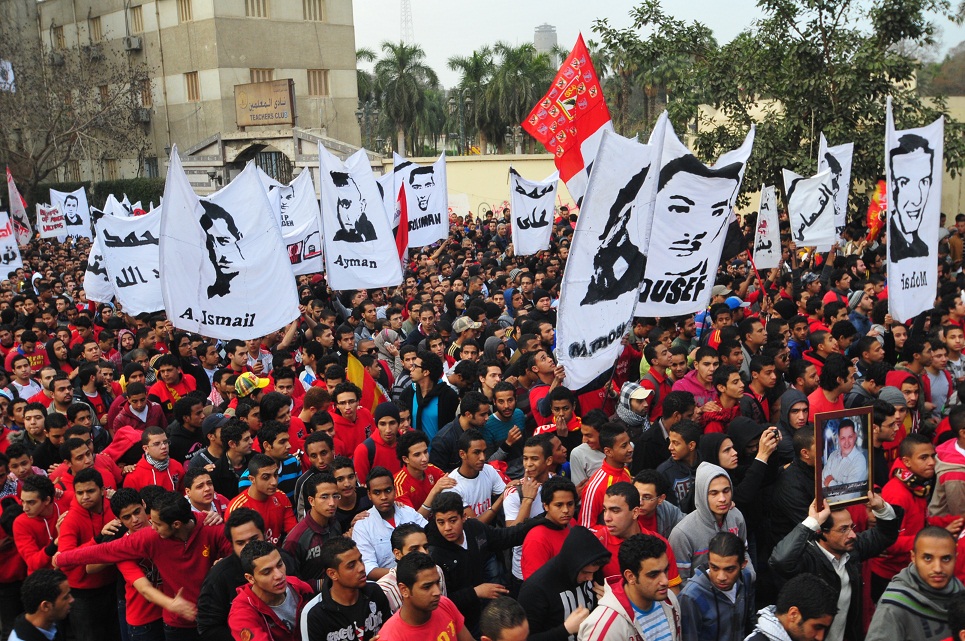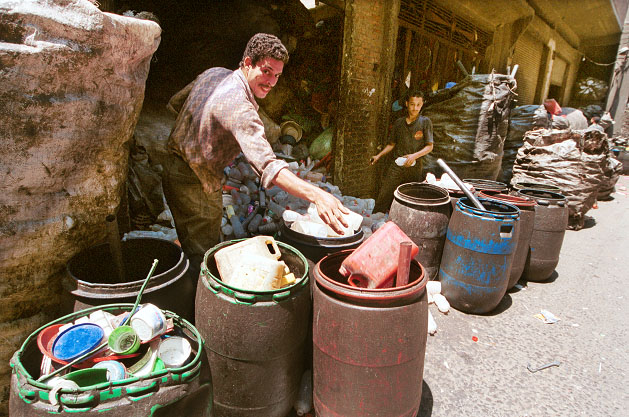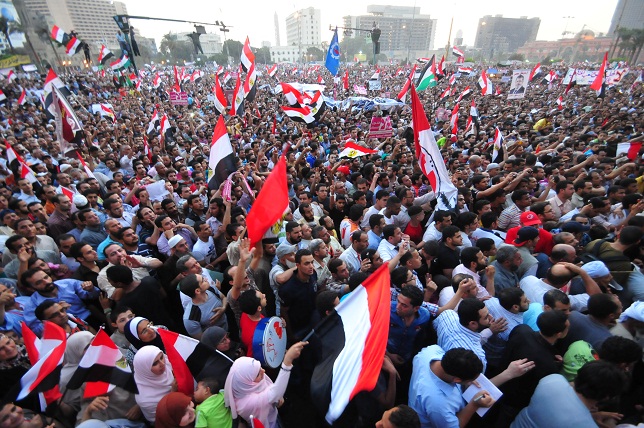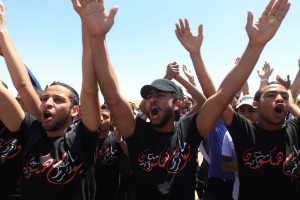
AFP Photo / Khaled Desouki
By James M. Dorsey
For decades soccer has constituted an alternative public space in the Middle East. Largely unnoticed by international experts, soccer provided a venue for the expression of pent-up anger and frustration against authoritarianism. By the time the Arab uprisings erupted in December 2010, soccer had emerged as a key non-religious, non-governmental institution capable of confronting repressive regimes.
Nowhere was this more pronounced than in Egypt, where militant, politicised, often violent ultras—organised clubs of soccer fans—played a key role in the protests that forced President Hosni Mubarak to resign in February 2011. Since his resignation, Egyptian ultras have continued to play a prominent role in Egyptian street politics.
The ultras are renowned for their fanatical support of their teams. With elaborate displays of fireworks, flares, smoke guns, loud chanting, and jumping up and down during matches, they hope to create an atmosphere in the stadium that encourages their team and intimidates opposing players and supporters. Like many of their counterparts in Europe and elsewhere, the ultras are fiercely independent, with bans on outside funding, and abide by strict rules that oblige them to attend their team’s every match.
As in many countries, Middle Eastern ultras are composed largely of young working class men who embrace a culture of confrontation—against opposing teams, against the state, and against expressions of weakness in society at large. Sometimes this culture manifests itself in acts of political rebellion.
For years, ultras in the Middle East have staged frequent stadium battles with the police and rival fans, a zero-sum game for control of a venue they saw as their own. States in the region viewed these autonomous, militant groups as a challenge to the regime’s monopoly on the means of coercion, and a potentially serious threat to their authority. In the name of public safety they turned football pitches into virtual fortresses, ringed by black steel and armed security personnel.
The ultras, for their part, radicalised in response to the militarisation of the stadium, though they did not always frame their militancy as political. “We steer clear of politics. Competition in Egypt is on the soccer pitch. We break the rules and regulations when we think they are wrong.
You don’t change things in Egypt talking about politics. We’re not political, the government knows that and that is why it has to deal with us,” The Guardian quoted a leader of an ultras group as saying (after his group overran a police barricade erected to prevent it from bringing flares, fireworks and banners into a stadium). In recent years, violent clashes erupted almost weekly.
States in the Middle East have long sought to control the stadium symbolically as well as physically. Elites sought to associate themselves with the sport through patronage and micromanagement, rewarding players and coaches when they emerged victorious and firing them when they failed. In late 2009, Mubarak saw an opportunity to fan the flames of nationalism after Egypt’s national squad lost to Algeria and failed to qualify for the 2010 World Cup in South Africa.
Libyan leader Muammar Gaddafi was not above associating himself with soccer as well. He adorned the country’s stadiums with quotes from his Green Book that explained his idiosyncratic theories of democracy, including the notion that both weapons and sports belong to the people. He appointed his son Al-Saadi—commander of a Libyan military unit that later played a crucial role in his father’s failed fight for survival in 2011—head of the Libyan Football Federation.
Al-Saadi placed himself in the starting line-up of the Ahly club of Tripoli and pursued a stormy rivalry with the Ahly club of Benghazi, the country’s second-largest city, which later led the revolt against Qaddafi. In 2000, he had the Benghazi team relegated to the league’s second division, its headquarters burnt to the ground, and several of its officials imprisoned for protesting blatantly rigged matches.
In Iran, as well, soccer pitches are political battlefields. Iranian President Mahmoud Ahmadinejad, a former soccer player, sought to associate himself with Iran’s national team in a bid to curry popular favour, though with limited success. His involvement backfired in 2009, just before presidential elections that sparked nation-wide protest, when Ahmadinejad “was accused of ‘jinxing’ the team, which suffered a last-minute defeat to Saudi Arabia just after Ahmadinejad entered the stadium,” according to a US State Department memo disclosed by Wikileaks.
The first uprising in the region erupted in Tunisia in December 2010, after the self-immolation of Mohamed Bouazizi in the town of Sidi Bouzid. This was not the first time that Tunisians had protested against the authoritarian regime of Zine El Abidine Ben Ali. Recent years had witnessed strikes, demonstrations, even other instances of self-immolation. In November 2010, weeks before the uprising, Tunisian soccer fans clashed with security forces after a tense championship match between Esperance Sportive du Tunis and TP Mazembe from the Democratic Republic of Congo.
For more than a decade, Tunisian ultras had forged links with Takriz, a secretive self-described “cyber think tank and street resistance network,” founded in 1998, whose name is a street-slang profanity that expresses a feeling of frustrated anger. In 1999, several Takriz activists attended a Tunisian soccer cup match that erupted in violence with scores injured, several fatally. The ultras’ militant spirit impressed the activists, who reached out to fan groups and developed a web forum for ultras from different teams. At the end of 2009, Takriz and the ultras decided the time was right to mobilise.
“So we turned up the heat in the stadiums and started boiling the Internet. We decided to fuck everybody,” said Foetus, one of Takriz’s founders, who identifies himself only by his alias in an interview with Technology Review. They used Facebook to put opposition forces on the spot for being too timid and intimidated.
“We had to ‘electroshock’ them to get people to do that last step. Then we built momentum, momentum, momentum,” said Waterman, the alias for another Takriz founder. In the street battles that ensued with security forces in early 2011 in the run-up to Ben Ali’s departure into exile on 14 January, in which some 300 people were killed, ultras and members of Takriz formed the protestors’ fighting core.
In Egypt some fervent fans of the top clubs had become politicised too. “I made my first steps into politics in 2000,” said Mohamed Gamal Besheer, author of Kitab al-Ultras (The Ultras Book), who is widely seen as the godfather of the Egyptian ultras movement. “I was against corruption and the regime and for human rights. Radical anarchism was my creed. Ultras ignore the system. You do your own system because you already own the game. We see ourselves as organisers of anarchy. Our power was focused on organising our system.”
Some ultras made contact with like-minded militant fan groups in Serbia, Italy, Russia, and Argentina, developing friendships and in a few instances even long-distance relationships.
Ahmed Fondu, a co-founder of one of the Egyptian ultras, was drawn into the movement in this way. “Soccer is a way of life for me. I made my transition to the ultras on the Internet. I encountered the fans movement. They were about bringing the game back to the fans. I talked to them every day for three or four years, and I’d check the newspapers every day,” said Fondu, who met his Serbian girlfriend through his connections with Belgrade ultras.
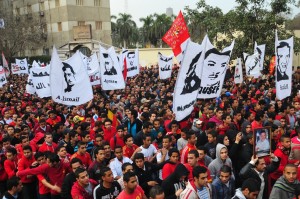
Hassan Ibrahim
“We are normal people. We love our country, our club and our group. We are fighting for freedom. That was the common thing between the revolutionaries and the ultras. We were fighting for freedom in the stadiums. The Egyptian people were fighting for freedom. We invested our ideas and feelings in revolution,” he added.
Less than two weeks after Tunisian ultras and other protestors forced Ben Ali to leave the country, Egyptian ultras followed suit. The first major protest in Egypt was planned for Cairo’s Tahrir Square on 25 January, 2011. The day before the protest, the two leading ultras groups in Cairo issued statements on their Facebook pages stressing that they were nonpolitical organisations, but that their members were free as individuals to participate in the protests. “The group emphasises that its members are free in their political choices,” said the statement by the Ultras Ahlawy, supporters of the Ahly club.
Privately, both groups told their followers that the demonstration was what they had been working towards in four years of almost weekly clashes with security forces in the stadiums of Cairo. The ultras, unlike most other groups in Tahrir Square, were braced for violent confrontations. “We fought for our rights in the stadium for four years. That prepared us for this day. We told our people that this was our litmus test. Failure was not an option,” said Fondu.
On 25 January, Mohamed Hassan, a soft-spoken 20-year-old computer science student, aspiring photographer, and a leader of the Ultras White Knights, led a march from the Cairo neighbourhood of Shubra that grew to 10,000 people. They marched through seven security barricades to Tahrir Square. A group of White Knights, including Mohamed, sought at one point to break through a police barrier to reach the nearby parliament building. “When I see the security forces, I go crazy.
I will kill you or I will be killed. The ultras killed my fear. I learnt the meaning of brotherhood and got the courage of the stadium,” he said. He pointed to a scar on the left side of his forehead from a stone thrown by police, who stymied the fans’ first attempt to break through to parliament. As blood streamed down his face, he regained his courage from the crowd behind him: “They are our brothers. We can do this,” he heard people shout.
The ultras’ street-battle experience helped other protesters break down barriers of fear that had kept them from confronting the regime in the past. “We were in the front line. When the police attacked we encouraged people. We told them not to run or be afraid. We started firing flares. People took courage and joined us, they know that we understand injustice and liked the fact that we fight the devil,” said Hassan.
During the 18-day occupation of Tahrir Square, the battle experience of the ultras was evident in the organisation and social services that they helped to establish. Protestors were assigned tasks and wore masking tape on which they were identified by their role, such as medic or media contact.
The ultras patrolled the perimeters of the square and controlled entry. They manned the front lines in clashes with security forces and pro-government supporters. Their faces were frequently covered so that the police, who had warned them by phone to stay away from Tahrir Square, would not recognise them.
Years of confrontation with security forces prepared them for the struggle for control of the square when the president’s loyalists employed brute force in a bid to dislodge them. The ultras’ battle order included designated rock hurlers, specialists in turning over and torching vehicles for defensive purposes, and a quartermaster crew delivering projectiles like clockwork on cardboard platters.
The Egyptian uprising managed to bring together two ultras groups, the Ahlawy and the White Knights, whose clashes had made Cairo home to one of the most violent soccer rivalries in the world. Their teams—Al-Ahly, which has won Egypt’s championship 34 times and the African championship six times, and Zamalek, with 14 Egyptian championships and five African championships—had to play on neutral ground; foreign referees were flown in because no Egyptian was believed to be neutral. On match day, the stadium resembled a fortress as riot police, soldiers, and plainclothes security personnel sought to keep the fan groups apart.
Their rivalry dated back a century: Al-Ahly was founded by Egyptian nationalists in 1907; Al-Zamalek was founded in 1911 by Europeans and was associated with the Egyptian monarchy. Today, the clubs’ fan bases are indistinguishable, and both see themselves as representing the common people against an oppressive elite. The shared experience of protest since early 2011, battling shoulder to shoulder against security forces, has altered relations between their groups of ultras, even if it has not erased their deep-seated rivalry.
In January 2012, the White Knights called for a truce with the Ahlawy, in advance of a match between their two teams. “We are asking for an end to the bloodshed, and to reconcile and unite for the sake of Egypt,” the statement said. The Ultras Ahlawy replied with a smiley-face icon.
In the months after Mubarak’s resignation, Egyptian security forces were reluctant to confront the ultras, in the streets or in stadiums, out of concern that clashes would undermine the military’s efforts to repair its tarnished image. That truce ended in September 2011, when Ahlawy ultras shouted obscene slogans against Mubarak and his former interior minister during an Egypt Cup match between Al-Ahly and Kima Aswan. Both men were on trial for their alleged role in hundreds of deaths during the anti-government protests that led to Mubarak’s ouster. In the ensuing clash, 130 people were wounded, including 45 policemen, and 20 ultras were arrested.
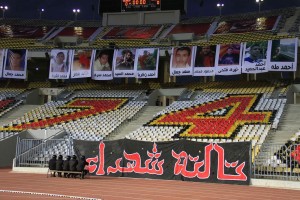
Mohamed Hamza
Several days later, Ahlawy and Zamalek ultras joined together in large demonstrations demanding an end to military rule. Again in November 2011, ultras joined protestors who retook Tahrir Square from security forces, in clashes that left 50 dead and thousands injured. In February 2012, security forces stood by during a brawl after a soccer match in Port Said, Egypt, that left 74 Ahlawy ultras dead.
Egypt’s two top soccer competitions, the Premier League and the Egypt Cup, were cancelled in the wake of Port Said because of concerns over violence. Elsewhere in the region, soccer has been suspended for months at a time, from the moment that anti-government protesters took to the streets. In Syria, the indefinite suspension of professional soccer since early 2011 has pushed anti-government protesters, including soccer fans, back into the mosque.
In Algeria, where revolt petered out, at least for now, the regime and soccer fans have reached an informal understanding under which the militants returned to the stadium, where they are allowed to chant their slogans against President Abdelaziz Bouteflika, the military, corruption, and the cost of living. These arrangements constitute a fragile stand-off between protesters and the regime, which worries that anti-government agitation could spill out of the stadiums into the streets.
In Egypt, the ultras returned to the streets to demand justice for the victims of violence in Port Said. Ahlawys and White Knights marched through Cairo, chanting “the Ministry of Interior are thugs,” “I hear the martyr’s mother calling . . . ‘Who will get me my son’s rights,’” and “Down, down with military rule,” as well as soccer songs. More than 70 people, including nine security officials, have since been prosecuted for the deaths in Port Said.
During the trial, the ultras staged a protest outside the Egyptian parliament building, meeting formally with one another for the first time in their history and warning Egypt’s military rulers that they would sacrifice their lives to ensure that the instigators of the violence are swiftly brought to justice. They threatened joint action that would “not allow any football activities to resume unless complete justice is done”.
Soccer remains a battlefield as well as a prism from which to view social and political dynamics not only in those Middle Eastern and North African nations still governed by autocratic leaders, but also those that have toppled their presidents in the course of the Arab revolts. Militant soccer fans continue to be at the forefront of efforts to ensure that the goals of popular revolts are achieved, or to maintain pressure on governments in countries like Algeria where discontent is boiling just under the surface.
The soccer pitch is also, more than ever, a key venue in the Palestinian and Kurdish struggle for nationhood, the assertion of Berber and Iranian Azeri identity, and the fight for women’s rights. As a result, soccer in the Middle East and North Africa is likely to remain more than just a game in coming decades.
James M. Dorsey is a senior fellow at the S. Rajaratnam School of International Studies and the author of the blog, The Turbulent World of Middle East Soccer. This is an abridged version of an article that first appeared in Mobilisation.
